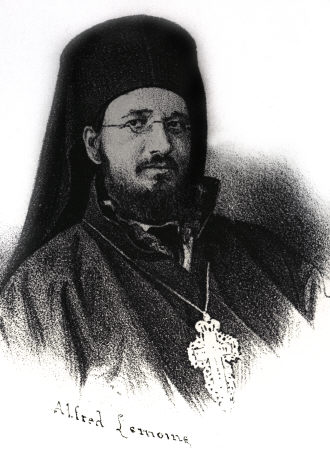TwoNoteableCorruptions
Well-known member
In 1856, in Germany, Constantine Simonides was arrested and imprisoned for fraud.
What can we learn about Simonides character, personal integrity, sense of honor, and trustworthiness from this episode in his life?
What do we know about it?
What are the facts?
Stay on topic. Don't post here, if it's not on this specific topic of his arrest and imprisonment in 1856.
Simonides’ New Testament Papyri: Their Production and Purported Provenance
Tommy Wasserman on the most notorious New Testament forger
July 6, 2018
A few years earlier Simonides had succeeded in duping several prominent scholars, collectors and librarians. Among his greatest victims were the renowned German professors in Lepzig, Rudolph Anger, Leopold Gersdorf, and Karl Wilhelm Dindorf. In July 1855 he had showed Anger and Gersdorf Greek manuscripts and sold them a copy of the Shepherd of Hermas (part of which Simonides himself had copied at Mt Athos) which the two professors subsequently published in 1856. Before the publication of Hermas, Dindorf was informed by Simonides of another very important palimpsest manuscript entitled “Three Books of Records of the Egyptian Kings, by Uranius of Alexandria, son of Anaximenes.” When Dindorf had inspected it, he came to Simonides in the company of Anger, full of excitement and offered to buy the manuscript for the Bodleian library. The Athenaeum, February 23rd, 1856, reported that “Simonides presented the palimpsest of Uranius to the Academy of Berlin.” Apparently, the Academy appointed a commission to examine its genuineness “with the assistance of some of the first chemists of the day” and they declared it to be authentic, and proposed that the King of Prussia acquire it “at a very high price,” which amounted to 5,000 thalers. The sum was never transferred, although Dindorf had paid 2,000 thalers to Simonides in advance. Dindorf was so eager to make the discovery known to the world, The Athenaeum continues, “that he had a specimen of it printed without delay.” In the meantime, Tischendorf had declared the Uranius manuscript a forgery on paleographic grounds, whereas Professor Karl Richard Lepsius, while delighted at first that it confirmed his system of Egyptian chronology, eventually realized that “the coincidences between Uranius and the writings of Bunsen and himself were of too startling a nature.” He travelled to Leipzig with a policeman to arrest Simonides and take him to Berlin. Simonides was soon released from the prison in Berlin and was under the radar for several years before he appeared in England to find new victims of his scams. While in England, he would also try to get back at Tischendorf, now his sworn enemy.
(Emphasis added by me)
https://themarginaliareview.com/sim...ri-their-production-and-purported-provenance/
Tommy Wasserman on the most notorious New Testament forger
July 6, 2018
A few years earlier Simonides had succeeded in duping several prominent scholars, collectors and librarians. Among his greatest victims were the renowned German professors in Lepzig, Rudolph Anger, Leopold Gersdorf, and Karl Wilhelm Dindorf. In July 1855 he had showed Anger and Gersdorf Greek manuscripts and sold them a copy of the Shepherd of Hermas (part of which Simonides himself had copied at Mt Athos) which the two professors subsequently published in 1856. Before the publication of Hermas, Dindorf was informed by Simonides of another very important palimpsest manuscript entitled “Three Books of Records of the Egyptian Kings, by Uranius of Alexandria, son of Anaximenes.” When Dindorf had inspected it, he came to Simonides in the company of Anger, full of excitement and offered to buy the manuscript for the Bodleian library. The Athenaeum, February 23rd, 1856, reported that “Simonides presented the palimpsest of Uranius to the Academy of Berlin.” Apparently, the Academy appointed a commission to examine its genuineness “with the assistance of some of the first chemists of the day” and they declared it to be authentic, and proposed that the King of Prussia acquire it “at a very high price,” which amounted to 5,000 thalers. The sum was never transferred, although Dindorf had paid 2,000 thalers to Simonides in advance. Dindorf was so eager to make the discovery known to the world, The Athenaeum continues, “that he had a specimen of it printed without delay.” In the meantime, Tischendorf had declared the Uranius manuscript a forgery on paleographic grounds, whereas Professor Karl Richard Lepsius, while delighted at first that it confirmed his system of Egyptian chronology, eventually realized that “the coincidences between Uranius and the writings of Bunsen and himself were of too startling a nature.” He travelled to Leipzig with a policeman to arrest Simonides and take him to Berlin. Simonides was soon released from the prison in Berlin and was under the radar for several years before he appeared in England to find new victims of his scams. While in England, he would also try to get back at Tischendorf, now his sworn enemy.
(Emphasis added by me)
https://themarginaliareview.com/sim...ri-their-production-and-purported-provenance/
What can we learn about Simonides character, personal integrity, sense of honor, and trustworthiness from this episode in his life?
What do we know about it?
What are the facts?
Stay on topic. Don't post here, if it's not on this specific topic of his arrest and imprisonment in 1856.
Last edited:

